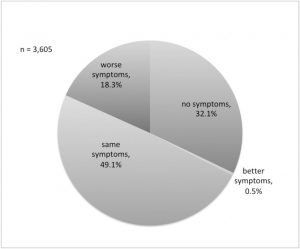The use of face masks can cause irritation of the ocular surface.
For more than a year now, people all over the world have been trying to live with the COVID-19 pandemic by taking all measures that can help reduce the risk of transmission of the SARS-Cov-2 infection. In this process of adaptation, a new item of clothing has become part of the daily routine: the facial mask.
All health and governmental guidelines recommend its use as a means of primary preventionbut it seems that wearing it for a prolonged time is perceived as a source of discomfort and is associated with complaints such as headaches, slight breathing difficulties, skin irritation, sweating and fogging of glasses.
With regard to the ocular apparatus, an increase in the symptoms of dry eye, a phenomenon that was first reported in June 2020 by an American ophthalmologist, Dr. Darrel E. White, who also coined the acronym MADE: Mask-Associated Dry Eye. The review is dedicated to this extremely topical issue:
Self-reported symptoms of mask-associated dry eye: A survey study of 3,605 people
Boccardo L.
Cont Lens Anterior Eye. 2021 Jan 20;S1367-0484(21)00007-2.

Dr. Laura Boccardo from the University of Florence collected and processed data provided by 3,605 people through a questionnaire distributed via Google Forms on various social platforms.
The survey found that 2,447 participants reported symptoms of ocular discomfort26.9% stated that their symptoms were exacerbated by wearing the mask, and 18.3 % of the total complained of a dry eye associated with the mask (MADE).
Since the continuation of the pandemic will most likely prolong the need to wear a mask on a regular basis, ophthalmologists should first of all be made aware of any clinical signs in their patients who complain of subjective symptoms of MADE, also to prevent forms of rejection of this IPR.
It would also be appropriate to recommend correct methods for reduce ocular discomfortsuch soothing measures as:
- the regular use of ocular lubricants
- limit as much as possible the stay in air-conditioned rooms
- take frequent breaks when using digital devices.
You can read the full text of the review via this link
Good reading
You might also be interested in:
Dr. Carmelo Chines
Direttore responsabile
